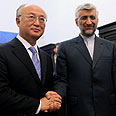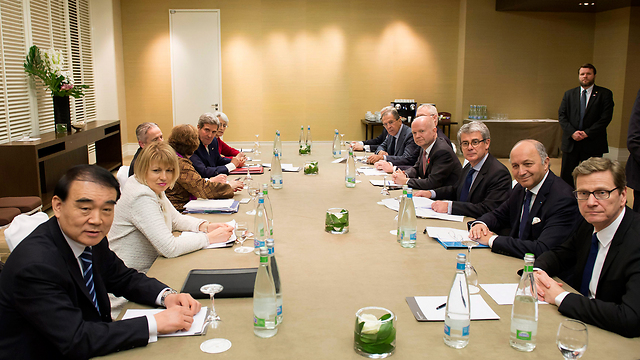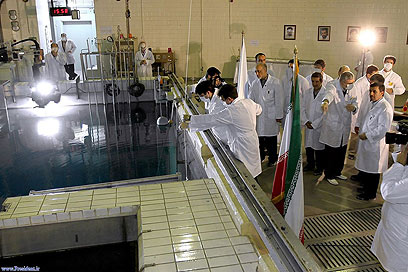
Iran, UN nuclear agency reach deal on 'roadmap for cooperation'
Despite failed Geneva talks, head of the UN's atomic watchdog lands in Tehran for 'independent talks' which could end in 'confidence-building measures.' Deal with IAEA could help repair damaged hopes for progress in Geneva talks
Iran and the UN nuclear watchdog Monday reached agreement on a "roadmap for cooperation" to resolve outstanding issues linked to Iran's controversial atomic drive, nuclear chief Ali Akbar Salehi said.
UN nuclear watchdog chief Yukiya Amano arrived in Iran on Monday as world powers pressed efforts to clinch a deal on Tehran's nuclear program following failed negotiations in Geneva.
Related stories:
- Israeli official: US wants to sign Iran deal to avoid strike
- Iran seeks 'practical solution' to rift with UN inspectors
- Report: Iran deputy industry minister shot dead
"We had successful negotiations regarding further cooperation between Iran and the (International Atomic Energy) Agency in various fields," Salehi said at a joint press conference in Tehran with IAEA head Yukiya Amano.
"This led to agreeing on a joint statement that sets the roadmap for cooperation," he said in remarks broadcast live on state English-language channel Press TV.
According to initial reports by the Iranian news agency ISNA, the two also agreed that the IAEA will be allowed to visit the Arak plant as well as the Gachin uranium
The International Atomic Energy Agency (IAEA), Amano was quoted as saying on English channel Press TV, "is committed to resolve all outstanding issues to ensure Iran' nuclear program is exclusively for peaceful purposes." Before leaving Sunday, Amano noted that his negotiations were "independent" to those of Iran with six world powers, known as the P5+1.
After Iran and the six powers dramatically fell short in Switzerland, a deal with the IAEA could help repair damaged hopes for progress ahead of the next P5+1 round on November 20.
"The only reason he (Amano) would go would be if he's confident that they were going to agree on something," one Western diplomat in Vienna told AFP, predicting an initial accord with "confidence-building measures."
Talking to a scrum of reporters before he took off from Vienna airport on Sunday, the Japanese Amano said that Iran and the UN body had reached a "very important point."
"Iran presented a new proposal (to the IAEA) last month that includes practical measures to strengthen cooperation and dialogue, and we hope to build on it," Amano said. Mindful of his last Tehran trip in May 2012 when he failed to clinch an accord, Amano though stopped short of echoing Iran's IAEA envoy in predicting a breakthrough.
Strong indicators
The IAEA conducts regular inspections of Iran's nuclear facilities but it also wants Tehran to answer allegations that it was trying before 2003, and maybe since, to develop a nuclear weapon.
Iran denies seeking or ever having sought nuclear weapons, and says the IAEA's claims are based on faulty intelligence from the likes of the CIA and the Mossad.
For two years and in numerous meetings, Tehran has resisted IAEA requests to visit sites where these alleged activities took place as well as to consult documents and speak to certain Iranian scientists.
The sites include the Parchin military base where the IAEA wants to probe claims that scientists conducted explosives tests that it says would be "strong indicators of possible nuclear weapon development."
But the election this year of the more moderate Hassan Rohani as Iranian president has created fresh hope and momentum, as it has with Iran's separate but related talks with world powers. Those discussions with the United States, China, Russia, Britain, France and Germany are focused more on Tehran's current activities, in particular uranium enrichment, with Iran seeking sanctions relief.
The two diplomatic "tracks" are closely related, however, since world powers want Iran to answer the IAEA's questions in order to ease fears that Tehran wants the bomb.
The six countries – all of which except Germany have nuclear weapons – also want Tehran to submit to more intrusive inspections by the watchdog as part of a wider accord.
The IAEA would also be closely involved in monitoring any freeze in enrichment and in Iran sending its stockpiles of nuclear material to a third country.
Hopes had soared for a deal in Geneva after foreign ministers including US Secretary of State John Kerry joined the talks. But cracks emerged among the powers and nothing was signed.
Israel has refused to rule out bombing Iran and has expressed massive misgivings regarding a deal with Iran, calling the mooted agreement "bad and dangerous."
- Receive Ynetnews updates directly to your desktop












